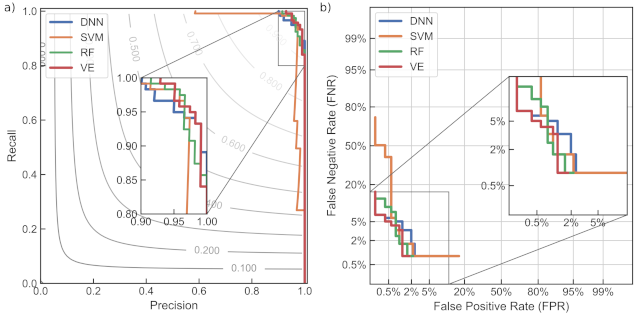Dataset
Dataset is deposited on zenodo: Power System Transient Stability Assessment Simulations Dataset - IEEE New England 39-bus test case DOI: 10.5281/zenodo.4521886
Dataset contains phasor measurements (PMU) signals from the IEEE New England 39-bus power system test case network, which are generated from a large corpus of systematic MATLAB®/Simulink electro-mechanical transients simulations. Different load and generation levels of the New England 39-bus benchmark power system are systematically covered, as well as all three major types of short-circuit events. Dataset contains time-domain signals from 9360 different simulations.
ML Models
Jupyter Notebook rendered on nbviewer: PSS-ML2
Undercomplete denoising stacked autoencoder for the unsupervised dimensionality reduction of the features space. A deep neural network classifier from the pretrained autoencoder (with transfer learning from the encoder). A soft voting ensemble built from a support vector machine and a random forest classifiers. Ensemble weights obtained from solving a constrained optimization problem. Hyperparameters fine-tuning using a randomized search and the Bayesian optimization. Classifier calibration with precision-recall curves, receiver operating characteristic and detection error trade-off curves. Metrics include ROC-AUC score, F1 measure, Matthews correlation coefficient and Brier score.
Sarajcev, P.; Kunac, A.; Petrovic, G.; Despalatovic, M. Power System Transient Stability Assessment Using Stacked Autoencoder and Voting Ensemble. Energies 2021, 14, 3148. https://doi.org/10.3390/en14113148
